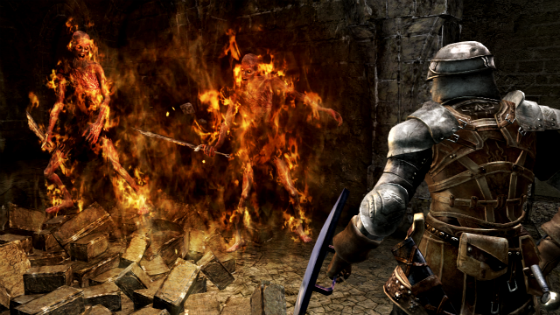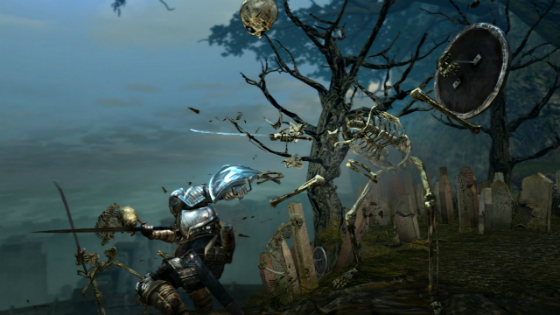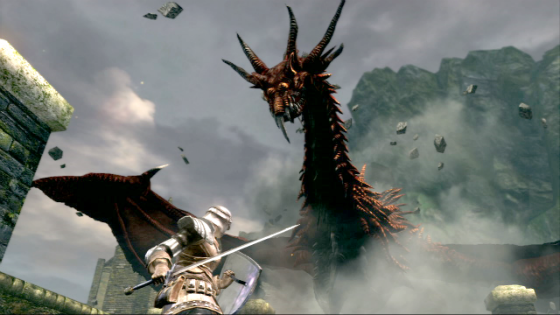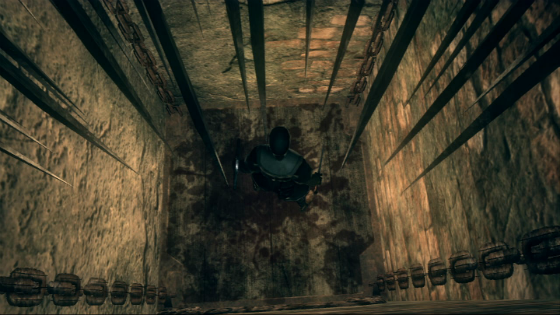Dark Souls: What is Best in Death?
 Monday, October 17, 2011 at 12:20PM
Monday, October 17, 2011 at 12:20PM 
Dark Souls, what is best in death?
Crush the players, see them driven before you, and hear the lamentation of their women.
That is good. As the successor to 2009’s sleeper hit Demon’s Souls, Dark Souls keeps much of what worked the first time around, while adding one crucial element: greater difficulty. The sadists which comprise developer From Software have no reservations in telling players they will be defeated mightily, and often. When the slogan of your game is “prepare to die” I think you’re dropping hints as to what players should expect. So much death.
The game begins with a very average character creator in which you can build a custom hero from a template or play with a variety of sliders to reach your desired look. I try to make my hero – Draen – resemble me as much as possible. Not quite close, but he’s no troll either, so it will do. Though I will say your appearance doesn’t matter, and I’ll touch on why a bit later. You must also choose a class before beginning your adventure. Unlike typical class-based role-playing games, you are not stuck with your class once you choose. Think of the starting class as nothing more than a set of starting equipment. Though different classes are spec’d differently to start, once you begin progressing through the game, you can turn your chosen warrior class into the illest sorcerer the world has ever known, provided you live to tell the tale. Each skill point (received when leveling up) is as valuable as a mess of currency (called souls), so allocate wisely, my friend. The online consensus for best starting classes seem to be Bandits for their strength as users of heavy weapons and armor, wanderers for their dexterity, mobility, and swift attacks, and pyromancers for their ability to deftly juggle spells and melee. Though in the end, personal preference trumps all. Fair warning: specialize! Spec your character with specific stats, and try not to haphazardly assign skill points. This will lead to perpetual death. As a wanderer, I focused on dexterity to increase attack power with fast weapons, vitality to increase health, endurance to bolster stamina, and just a touch of faith to learn the useful white magicks. Once you make it past character creation, a huge surprise is in store: you die! Bet you didn’t see that one coming, did ya? Demon’s Souls veterans will not be impressed by the tactic of dropping a nigh impossible boss at your door step. So here's a hint: you don’t have to kill him, but if you do you will be rewarded in turn.

Dark Souls is hell. I don’t remember the last time a game made me upset to the point of slamming my desk in anger and frustration. Over the course of my game I was ambushed, crushed, cut open, burned, pierced, had my neck sliced, defensively rolled off cliffs, mistepped on slim ledges, and the list just goes on. There is just a shred of comfort in knowing my death was a direct result of my actions, for the most part. Performing the wrong action at the wrong time is the quickest way to die. As stamina governs all of your physical actions, if your enemy has a rather large weapon, and you’ve wasted all your stamina slashing away at him, don’t expect to block his counter attacks. As a matter of fact, don’t expect to live. Patience is key at all times, attempting to rush through the game is of no benefit. To this end, actions slightly queue, so if you’re button mashing the attack button to get in a quick slash after a block, you’ll probably slash twice. And of course, that second slash will probably be punished in turn. Absolutely unforgiving. Enemies are everywhere, from in plain sight, to hiding in the environment. The undead bursting out of a wall! Giant poisonous rats pouncing from the remains of a shattered barrel! An ambush of shrubs-turned-tree-men. Dark Souls has a nasty habit of surprising you, then killing you shortly thereafter, so to say be alert would be a huge understatement.
As death is such an integral part of the game, let’s discuss a little bit about what happens when you bite it. Most importantly, you lose all your accumulated currency, known as souls. Without these souls, you cannot repair equipment, you cannot buy items, you cannot even level up. Souls in essence, keep the playing field level, though not really. If you can make it back to the site of your death and touch your own blood stain, you’ll recover all your lost souls. However, if you die en route to your crimson puddle, you lose all your souls, and your sanity will surely follow shortly after. Example: I had accidentally ventured into a boss room with a couple thousand souls, which at the point of the game I was at, was a lot. This boss rushed me as soon as I zoned in, and killed me at a peculiar spot. All concurrent recovery runs ended the same way: recover souls, die. Recover souls, die, recover souls die, again and again. After about 30 minutes wasted on this, I gave up. And by gave up, I mean I lost my patience and attempted to rush to the boss zone, only to be slaughtered along the way due to a sloppy showing of swordsmanship. Fail.

Another interesting part of the game is the focus on Humanity. You begin the game as an undead, complete with a mangled face only a blind man could love. You spend most of the time in this undead form, which is why I mentioned your character’s frivolous facial features. You’ll find humanity throughout the game, either on corpses, after defeating bosses, or by outlasting enough enemies without dying - as if. Humanity can be cashed in at bonfires - seldom found hubs which act as checkpoints – and once redeemed offer a few benefits. Greater resistance to afflictions, stronger magical ability, increased dialogue options with NPCs, ability to summon friendly phantoms, among other things.It is handy when you have it, though that moment of humanity will be forever fleeting.
Much like Demon’s Souls, this Dark brother is incredibly creepy in its ambiance. For most of your quest, you will not be able to see much farther than you can spit. But who needs visibility, right? During many parts of my adventure, I was literally scared of what lay in wait for me. I could no longer pillage bodies for treasure without the fear of a bandit backstabbing me, or run up a staircase without worry of not one but two giant stone golems locking me in a pincer attack. Why Dark Souls, why?! This is where the multiplayer aspect comes in. Though you’re not constantly playing with other folks, you can see their impact around you. Early on, you’ll receive an item which allows you to leave notes in the world, which appear as a bright orange glyph on the ground. By patching together simple phrases from a fixed list of words – including techniques, directions, items, and so on – you can inform fellow adventures of upcoming dangers or treasure. You can note the tips for defeating bosses such as “weakness: tail” or alert to a hidden path with “illusory wall ahead.” It’s also possible to be a troll with phrases like “need head” or “try jumping” thoughtfully written at the rim of a bottomless pit. After spending enough time in Dark Souls, you will actually contemplate making that jump, too. A blood stain in the environment should always be touched, as it will summon a ghost of an adventurer who came before you, and you’ll see how he met his untimely end. If that ghost trots down the same murky path you were headed, you should have your shield up and walk slowly, at the very least.

A more proper incarnation of multiplayer is summoning souls from other planes. Early in the game, you’ll receive a summon stone, which you can use to write a white message on the ground. This is often done around especially difficult areas or near boss battle. After your message is written, a traveler can cash in and bring you to their world to die together for a short period of time, or vice versa. In certain areas, you can even summon an NPC for the assist. Conversely, your world can be invaded by a hostile warrior, known as a black phantom. These are usually very powerful, high level players who are built for player-vs-player and just want to make your stay in Dark Souls more hellish than it already is. This game does not do much to explain how many of the mechanics work, so much like the adventure itself, you learn as you die.
Due to Dark Souls aversion to light, I feel as if much of the game’s environment looks no better than Demon’s Souls, graphically. The enemies however, are brilliantly designed, specifically bosses. They tend to be equal parts hideous and frightening. If their overwhelming size doesn’t inspire fear, their ridiculous features will. A fire breathing dragon who wields a halberd and has an axe fused onto its tail? That’s not even logical, let alone fair. But that’s Dark Souls. Though most areas are graphically average, the design of the world is way above par. As opposed to the original, where the Nexus served as a hub to different areas that were a load screen away, most of Dark Souls falls under one large, open map. It’s so large in fact, as you progress you will continually find shortcuts back to the Firelink Shrine, your de facto home base of operations, populated by many helpful NPCs. I’m truly impressed by the developers ability to connect the different areas together so easily. When present, the music is extremely fitting, perfectly illustrating the transpiring events. Outside of boss battles, there is usually only the ambient silence of the hostile environment, which lends to the isolation and despair one feels after continually failing.

Dark Souls, much like Demon’s Souls, is not for everyone. One friend sat through 15 minutes of my adventure before saying “this game sucks” and going to load up Gears of War 3 in the next room. This is not an action packed affair. It’s a deliberate dance of death, one that interested parties will be consumed by for weeks, possibly months. There is no hard level cap, it is possible to boost all your stats to 99, and I feel like parts of the game will demand max stats to overcome. Dark Souls is deep and desolate, unexplained and often misunderstood. The frustration of trying to successfully pass any given area is quickly wiped away once your goal is achieved. There is no finer feeling than finally slaying a demon, or deftly avoiding a gauntlet of booby traps after some memorization fueled trial and error. If you enter the experience with intentions to conquer all challenges in 8 hours, prepare to die. If you grind, level, and acquire the best items 100 hours in, prepare to die. There is no way around it. Dark Souls is what is best in death.
The Score: 8 outta 10 Blasters

 dark souls,
dark souls,  from software,
from software,  namco bandai games,
namco bandai games,  ps3,
ps3,  xbox360 | in
xbox360 | in  reviews
reviews 




Reader Comments